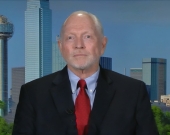Professor Dr.Malik Mufti to Gulan: The situation in the Middle East is so unstable unfortunately one cannot say that the worst has been reached yet
July 14, 2019
Exclusive Interviews

Professor Dr.Malik Mufti teaches courses on international relations as well as the politics of the Middle East. He received a Ph.D. and an M. A. from Harvard University, an M.A. from Yale University and a B.A. from Middlebury College. He is the author of Sovereign Creations: Pan-Arabism and Political Order in Syria and Iraq (1996), and Daring and Caution in Turkish Strategic Culture: Republic at Sea (2009). He has also written shorter pieces on the domestic politics, international relations, and political thought of the Near East, including his latest journal articles "The AK Party's Islamic Realist Political Vision: Theory and Practice" (Politics and Governance, October 2014); "Democratizing Potential of the 'Arab Spring': Some Early Observations" (Government and Opposition, July 2015); and "Neo-Ottomanists and Neoconservatives: A Strange Alignment in the 1990s" (Insight Turkey, Winter 2016). He is currently working on a research project on realism in Islamic political thought. He is a recipient of the Lillian and Joseph Leibner Award for Distinguished Teaching and Advising. In a written interview he answered our questions as the following:Gulan: As you know the Middle East is deeply mired in many difficult challenges and crises, do you expect further disintegration and unraveling, or things can be turned around and this region can be led to a more peaceful and prosperous future?
Professor Dr. Malik Mufti: The Middle East is indeed experiencing numerous challenges and crises, and with the situation so unstable unfortunately one cannot say that the worst has been reached yet. However I remain convinced that the current upheavals herald the end of the "old politics" that has dominated the region since World War I, and hopeful that in the longer term the region is entering a period of more representative, transparent, and therefore effective governance.
Gulan: As you the peoples of this region have striven to have a better live and more effective governance, as we witnessed in the Arab Spring, but as we have seen the Arab Spring resulted in a deep frustration and further deterioration of the situation, but recently –especially in Sudan and Algeria- it looked like a second Arab Spring has erupted, your analysis in this regard?
Professor Dr. Malik Mufti: While the initial uprisings have been repressed in many places, and while the resurgence of authoritarianism has been supported by many powerful countries both in the Middle East and outside, the Arab Spring – and its continuing echoes in places such as Sudan and Algeria – suggest two crucial developments that will not be reversed: for the first time, the peoples of the region have shown that they want representative, democratic government as their primary political objective; and for the first time, they have shown that they have broken the barrier of fear even in the face of the most brutal regimes. So even if there are setbacks here and there, the process that began in 2010-2011 cannot be reversed, and we are instead likely to see a continuing cycle of populist uprising and authoritarian repression, of elected governments and military coups, until gradually the balance shifts decisively in the direction of democracy. But this will probably take decades rather than years.
Gulan: Many of the resource rich countries in this region are bedeviled by bad governance that leads to squandering the revenues generated form these resources, so can we say that the existence of these resources is a facilitating factor for the emergence of dysfunctional governance?
Professor Dr. Malik Mufti: Research in political economics strongly suggests that the presence of a valuable resource (such as oil), which a government can monopolize and exploit instead of having to rely on its population for tax revenues, has a negative influence on both economic and political development. It seems highly unlikely that such a situation can be reversed without first changing the form of government into a more democratic one, with transparency and accountability before the law.
Gulan: what is your overall evaluation of US administration maximum pressure campaign again Iran and squeezing that country economically? do you believe that it will lead to mutually accepted accommodation or these two countries are inevitably on the collision course?
Professor Dr. Malik Mufti: It is very hard to predict what will happen, because there are variables that are pushing both sides to escalate. The US sanctions on Iran appear to be having significant effects, and those could force the Iranian leadership to raise the costs for Washington by hitting back in Iraq or Lebanon or Palestine, or – as the Americans suggest has already happened – in the oil lanes of the open seas. At the same time, there are powerful actors, both domestic and in the Middle East, pushing President Trump toward a military approach, and if polling continues to indicate that he will do poorly in next year's presidential elections, it is not impossible that he may be tempted to resort to a military adventure to revive his electoral fortunes.
Gulan: On the other hand Mr. Trump administration has revealed some aspects of its so called Deal of the century, and obviously it is heavily and overwhelmingly relies on economic reward –so to speak-, so to what extent this approach will be effective and successful?
Professor Dr. Malik Mufti: The Trump administration is so blatantly biased in favor of the governing rightist coalition in Israel – the US ambassador there, for example, recently asserted that "Israel is on the side of God" – that it is inconceivable any initiative it presents can be acceptable to the Palestinians. Economic relief is urgently needed for the people of the West Bank and Gaza, but unless it is accompanied by real steps toward ending the Israeli occupation, it will not be enough. The plan, in my opinion, is doomed to failure.















